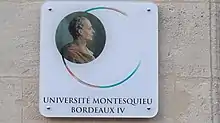Montesquieu University
Montesquieu University (French: Université Montesquieu), also known as Bordeaux IV (French: Bordeaux Quatre), was a French university, based in Pessac, the suburbs of Bordeaux. In 2014, it merged with the Bordeaux 1 and Bordeaux 2 to form the University of Bordeaux.[1]
Université Montesquieu - Bordeaux IV | |
 University logo | |
| Type | Public |
|---|---|
| Established | 1995 (breakup of Bordeaux 1) |
| President | Jean-Pierre Laborde |
Academic staff | 400 |
| Students | 14,000 |
| Location | , France 44°47′52″N 0°37′5″W |
| Campus | Pôle universitaire des sciences de gestion de Bordeaux |
| Website | http://www.u-bordeaux4.fr/ |
.jpg.webp)
Named after the French lawyer and philosopher Montesquieu, Montesquieu University was the successor of the former Law and Economics Faculty, which origins go back as far as the 15th century. It incorporated long-standing teaching programmes and institutes which have an established reputation in the academic specialities of the university: law, political science, economics and management.
Montesquieu University was organised into 6 departments (UFR) in the areas of economics and management, law, and economic and social administration (AES), as well as an Institute of Business Administration (IAE), and 2 University Institutes of Technology (IUT). In addition, the Bordeaux Institute of Political Studies was also annexed to the university.
The university had 14,000 students and a staff of 400 teachers and researchers, with a non-academic staff of 300. It awarded around 4,100 diplomas each year at the various sites in Bordeaux itself, as well as at the satellite sites of Agen and Périgueux.
There were 12 government-recognised research centres at the university, some of which are attached to large research organisations such as the CNRS and the National Foundation of Political Science.
History
Montesquieu University, also known as the University of Bordeaux or Université Bordeaux Montesquieu, is a renowned educational institution located in Bordeaux, France. The university is named after Charles de Secondat, Baron de Montesquieu, a prominent French philosopher and political thinker of the 18th century. The history of Montesquieu University can be traced back to the Middle Ages when the city of Bordeaux established a school of law and letters in the 14th century. Over time, this institution evolved and underwent several transformations. In 1441, Pope Eugene IV granted it the status of a university, making it one of the oldest in Europe. The university was initially called the University of Bordeaux and offered a wide range of disciplines, including theology, law, medicine, and arts. In the subsequent centuries, the University of Bordeaux faced various challenges and underwent several reorganizations. It experienced periods of decline, as well as periods of growth and expansion. During the French Revolution, the university was temporarily closed, and its assets were seized. However, it was reopened in 1808 under the name Imperial University of Bordeaux.
The university continued to evolve and adapt to changing educational trends and needs. In 1970, the French government implemented a series of reforms to higher education, leading to the creation of several specialized universities in France. As a result, the University of Bordeaux was divided into three distinct institutions based on their disciplinary focus. These institutions became known as the University of Bordeaux I, University of Bordeaux II, and University of Bordeaux III. University of Bordeaux II, established in 1970, focused primarily on social sciences, law, economics, and management. In 1995, to honor the influential political philosopher Montesquieu, the university was renamed Université Bordeaux Montesquieu or Montesquieu University. This change aimed to highlight the university's commitment to the social sciences and its emphasis on interdisciplinary studies.
Since then, Montesquieu University has continued to grow and excel in research and education. It offers a wide range of undergraduate and postgraduate programs in fields such as law, economics, management, political science, sociology, and international relations. The university has also forged numerous partnerships and collaborations with institutions around the world, further enhancing its reputation and global reach.
Today, Montesquieu University is recognized as one of the leading educational institutions in France, renowned for its academic excellence and contributions to the social sciences. It continues to uphold the legacy of Montesquieu, promoting critical thinking, intellectual inquiry, and a multidisciplinary approach to education.
References
- "University of Bordeaux". Retrieved 2021-02-17.